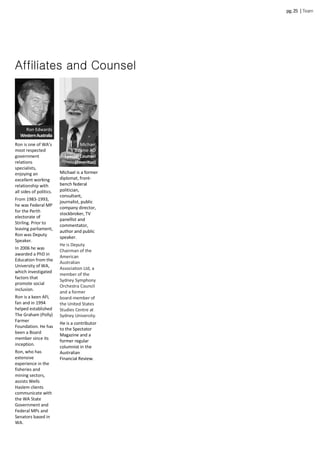The document summarizes the expansion of Wells Haslem Strategic Public Affairs through a new partnership with Rob Masters & Associates and InterCaptial Group. This will allow the firms to work together and expand their services nationwide. The partnership will combine the experience and expertise of both firms to provide strategic communication services across Australia.



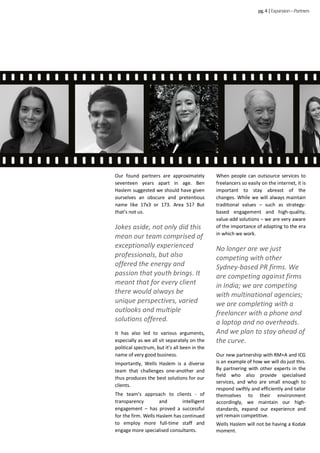

![Sitting in an RSL 70 years after it was written, the average Aussie
punter wouldn’t find much to disagree with Orwell. I wonder
what odds you would have secured following the Coalition’s
thumping Federal election victory in September 2013 on two
Liberal-National state governments being thrown out after only a
single term and the Prime Minister himself being subjected to a
leadership spill in the space of less than 18 months? As NSW
Premier Mike Baird nervously eyes the latest polls, he would be
hard-pressed not to conclude that Australian voter volatility
appears to be at an all-time high.
Australia’s over-paid polling and commentariat class struggles to
come to terms with the new normal – either
deriding the Prime Minister’s personal performance or in one
incredible case, blaming the electorate itself for not ‘toughening
up’. The reality is, the territory the game is played on has changed,
perhaps for good – and one or two need to update their
methodologies (…or get a lot quicker at cutting and pasting from
others). John Howard remarked to me that a generation ago,
pollsters and political strategists the world over could count on 40
per cent of ‘rusted-on’ support from reliable political ‘bases’. You
know the type, ‘I’d vote for a donkey, so long as it was wearing a
red rosette’. Today, that figure is probably closer to 20 per cent
and declines by the day. A kaleidoscope of parties is emerging, in
some cases defined by devotion to a single issue (e.g. the Greens).
Voter volatility
Identity, not ideology, moving voters
Mr Nicholas Wright, Research & Campaigns Director, Luntz Global
"Political language […] is designed to make lies sound truthful and murder respectable,
and to give an appearance of solidity to pure wind."
George Orwell
Photo by Graham Denholm](https://image.slidesharecdn.com/713493fd-8d5c-4b1a-bdcb-23c6eaa7286c-161108001550/85/ISSUE_5-6-320.jpg)


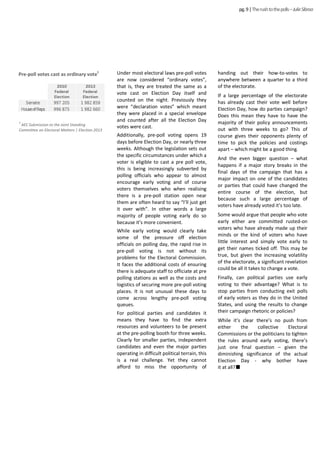
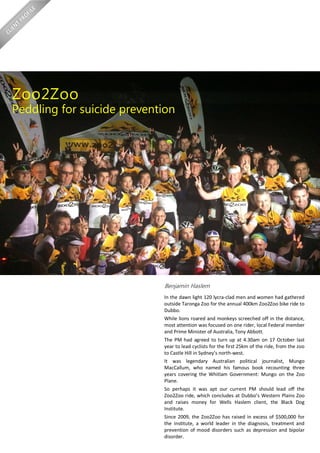
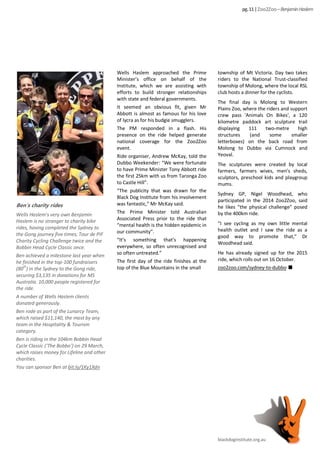
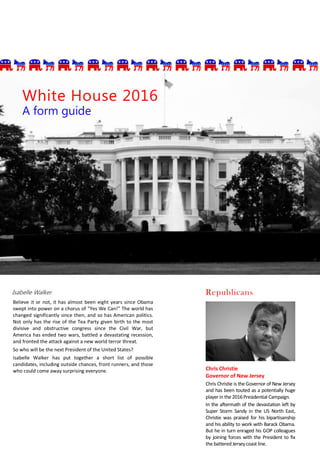
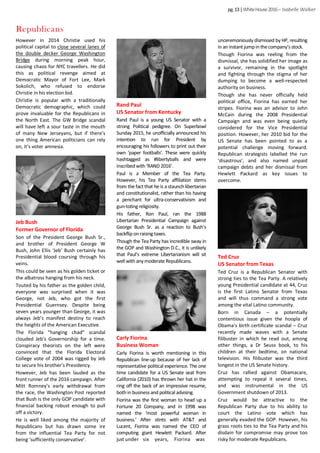



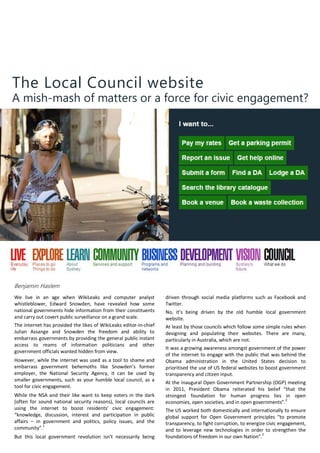


![BLOG SPOTwellshaslem.com.au/blog
Blog Spot wellshaslem.com.au/blog
Interesting piece by Kayla Matthews on
PR Daily about how the PR industry is
portrayed in popular culture.
This depiction may feed into journalists'
perception of the industry, though
obviously the media's own regular
interaction with PR professionals
colours its view.
Many of my former journalist colleagues
think we spend most of our days writing
media releases and phoning journalists.
Why wouldn't they; that forms the bulk
of their experience interfacing with PR
professionals.
While this may be true if you're an in-
house media manager or politician's
press secretary, the craft of PR is far
more complicated than that.
Communicating with stakeholders (any
person who has a stake in an issue,
event, policy etc that you are dealing
with) involves numerous channels, be it
via the media; through social media;
newsletters; e-mail; snail mail; websites;
conferences; community meetings;
focus groups; personal phone calls; F2F
calls, so on and so forth.
Before even communicating, it is
necessary to analyse each stakeholder
and stakeholder group:
o What is their interest in what our
client is doing?
o What is their expectation? How do
they think they should be treated?
o What is their level of influence
over other stakeholders?
o What is tactically the best way to
engage with them?
Once you've figured that out, you can
start thinking about the actual act of
communicating.
Not exactly how it's portrayed in
popular culture…
Keep reading: bit.ly/197uqJD
#3#2#1
Social media hath
fury when a vegan
scorned
21 November 2014- Benjamin Haslem
Can
digital media
influence justice?
6 February 2015 – Isabelle Walker
On February 6 2015 in Baltimore
County, Maryland, USA, a young man
who had spent nearly half his life in
prison had his first hope of an appeal
since his conviction 15 years ago.
Adnan Syad was convicted of the
murder of his ex-girlfriend, Hae Min Lee,
on 25 February 2000, following her 13
January disappearance and subsequent
murder. Her body was found in a
shallow grave on February 9 1999.
In what was for the state an open and
shut case of jealousy, pride and fatal
obsession, Adnan was given a life
sentence for the crime, despite
consistently protesting his innocence.
In 2014, former Baltimore Sun
journalist, Sarah Koenig was approached
by a family friend of Adnan’s. She was
charged with the task of delving deeper
into the case; interviewing numerous
friends, family and teachers of both Hae
and Adnan to investigate areas of the
case that had previously been left
untouched.
What has followed is the podcast Serial,
produced by Koenig, which has reached
over 68 million people so far. It had 12
episodes in its first season, and it
documents areas of the case Koenig has
explored and thoroughly research in her
capacity as an investigative journalist.
It was the opinion of Adnan’s family and
friends that the case had been severely
botched at trial by a defence attorney
(now deceased) who had made
deliberate oversights in order to get a
conviction and a subsequent appeal, to
increase her fee.
Koenig uncovered several flaws in the
state case, a convincing alibi for Adnan,
and numerous other holes in the case.
As mentioned above, he has just last…
Keep reading: bit.ly/1viepFf
The owner of a Hunter Valley
hamburger restaurant has learned the
hard way about the dangers of social
media.
His tale of woe is a salutary reminder to
all businesses that while social media is
a useful marketing tool, it can cause
massive harm if used incorrectly.
Mark Clews, part-owner of Tuk Tuk in
the Tempus Two winery complex about
two-hours north of Sydney, made the
mistake of ridiculing a vegan, as you can
see from the top screenshot at left.
As the Newcastle Herald reports: "... the
restaurant's Facebook page ha[s] been
swamped with more than 900 one-star
reviews… In screenshots of posts, Mr
Clews refuses to apologise and labels
detractors 'vegan Nazis'," the paper
reports (click on bottom screenshot at
left).
Mr Clews said angry social media users
tracked down his mobile phone number
and "made threatening phone calls up
until midnight".
The Tempus Two winery has distanced
itself from the fracas: "We would like to
advise that [these] comments and views
are not supported by Tempus Two, and
we in no way condone this behaviour by
Tuk Tuk Hunter Valley".
Mr Clews later told the Newcastle
Herald he would apologise to the
customer if she came back.
A new Facebook page – "Tuk Tuk Hunter
Valley Honest Reviews" – has since been
created by critics where comments
posted on the Tuk Tuk Facebook page -
but later deleted - are posted.
The yarn has created a great deal of
media interest, being picked up by the
Kyle and Jackie O show and Channel…
Keep reading: bit.ly/1KGFevy
10 ways popular
culture wrongly
depicts the PR industry
6 January 2015 - Benjamin Haslem](https://image.slidesharecdn.com/713493fd-8d5c-4b1a-bdcb-23c6eaa7286c-161108001550/85/ISSUE_5-20-320.jpg)
![A message from Eric Sidoti, Director of
the Whitlam Institute
While Gough Whitlam will be
remembered well beyond today, the
days ahead will be particularly special
times for remembering and for sharing
stories. They will be times of reflection
on the man Gough Whitlam. The Leader.
The intellectual. The visionary.
As one former Whitlam minister put it
to me this morning after news of
Gough's death, 'the memories are
crashing over me like the waves on
Bondi Beach.'
Gough Whitlam will be remembered in
many ways, but after this time of
personal memories and recollections,
Gough Whitlam will be remembered as
the reforming leader who willed a
modern Australia into being. His legacy
is woven into the very fabric of our daily
lives.
His achievements are not simply a
matter for history - they are embedded
in the living memory of our nation.
Gough Whitlam catapulted Australia
into the modern world. He claimed a
place for us in the region and in
international affairs. He educated a
generation: funding schools on the basis
of their need and opening our
universities to all on the basis of their
merit. He established universal health
care and for the first time, committed
the national government to developing
the outer suburbs of our cities as well as
regional Australia. He sought to right the
wrongs of Aboriginal dispossession and
he sought a place for all in this land we
share. He transformed our country and
the way we saw ourselves. Just as he set
out to, he 'uplifted the horizons of the
Australian people'…
Keep reading: bit.ly/16RrhfE
Our lives have been impacted by the
tremendous growth of China over the
past 50 years. The question is: what do
we have ahead of us?
Daniel H. Rosen, Jack Wadsworth
Fellow, Asia Society Policy
Institute, addressed these questions
today at the Asia Society Policy Institute
Australian launch of the Institute’s first
report: “Avoiding the Blind Alley: China’s
Economic Overhaul and its Global
Implications”.
China’s growth from 2000 to 2012 has
been unprecedented. This growth was
championed by Deng Xiaoping, who
opened up China to the world from
1992.
The sheer number of people in China
moving into the urbanised workforce
made a tremendous contribution.
However the impact of the one child
policy means China’s labour force is
destined to shrink — at least for the
foreseeable future. Education can make
up for this shortfall to a point; however
it will not fill the deficit.
Interestingly, the 2000s are referred to
as a lost decade for China, in regards to
lost productivity. Reform here is key.
President Xi Jinping will not weather the
next ten years without a crisis unless he
does something drastic to change the
road China is on. That is, he must take
bold steps to institute a new model if
the nation is to avoid crisis.
Mr Rosen evaluated China’s GDP
outlook and concluded that in the best-
case scenario – a soft landing through
2020 – reforms permit the
redeployment of capital from wasteful
uses to high-return sectors, so capital
stock growth and TFP improvements
deliver a combined GDP growth rate of…
Keep reading: bit.ly/1ybXzrC
Yesterday saw one of Australia's biggest
retailers make a rookie error - its
website crashed following the launch of
a much advertised product. Was it poor
tech planning or simply naivety about
the popularity of online shopping?
Popular for its cheap prices and staple
clothing and home wares, Target has
come under fire for poor planning in the
wake of its launch of Italian design
house, Missoni.
The company website crashed yesterday
when it was overwhelmed by the sheer
volume of online shoppers wanting to
be the first to snap up the cheap
designer clothing, kitchen, dining and
living items.
Easily avoidable, and definitely
foreseeable, shoppers are coming down
hard on the company saying the crash is
not a ‘badge of honour but a failure to
forecast’.
Savvy eBay users then took advantage
of the site’s crash to on-sell their shop-
bought items at a hugely inflated
price. It was reported that “A Missoni
for Target Multi-Wave A5 Set of
Notebooks [was] selling for $45 on eBay
versus $30 at Target online; a beach
towel for $129.99 versus $40 online at
Target; and a hand towel for $69.99
versus $20 on Target’s website.”
Online shoppers were livid at the site
crash, insisting that management should
have been prepared for the
unprecedented volume, especially in
light of the fact the same thing had
happened during the launch of Missoni
for Target in the United States.
By 10.30pm, the site was still down and
many had given up. One only imagines
the sales Target missed out on during
this time and whether there could…
Keep reading: bit.ly/1DgCD9r
#6
Where is
China and
where’s It Going?
30 October 2014 – Alexandra Mayhew
#5
Missed
the
target
7 October 2014 – Isabelle Walker
#4
The passing of
the Hon Gough
Whitlam AC QC
22 October 2014 - Eric Sidoti](https://image.slidesharecdn.com/713493fd-8d5c-4b1a-bdcb-23c6eaa7286c-161108001550/85/ISSUE_5-21-320.jpg)


![Robert Masters
Director
pg.24|Team
Robert Masters &
Associates (RMA) is
a strategic
communication
and stakeholder
engagement
consultancy.
Since its inception,
its approach to
strategic
communication
programs,
community
consultation and
stakeholder
engagement
processes have
earned it a
reputation of being
at the leading edge
of communication
management for
over 30 years.
Rob’s services and
clients cover the
energy sector (oil,
gas, coal),
electricity,
forestry,
government
(federal, state,
local) water,
finance,
automotive, health
and health
research,
pharmaceutical,
education,
transport (road
and rail),
information
technology,
primary industry,
environment and
retail.
Robert Masters & Associates & ICG Team
John Kananghinis
Senior Associate
Angus Nicholls
Senior Associate
Garry Oliver
Senior Associate
ChristopherGalloway
Academic Associate Maria Vampatella
Senior Consultant Kate Adamson
PR & media
Angus has in
excess of 15 years’
experience of
working with, in,
and around all
levels of
Government in
Australia, in roles
ranging from
lobbying, to
advising a Federal
Minister, and as an
elected
representative of
his local Council.
He was an Adviser
and Acting Chief of
Staff to a former
Federal Minister.
Complementing
Angus’
government
experience is his
commercial trading
background,
having run one of
the nation’s largest
seafood wholesale
and commercial
fishing operations
out of Melbourne.
Garry has close to
40 years of
consultancy
experience. Garry
has acted as a
consultant to
senior
management in a
wide variety of
public and private
sector
organisations on
government
relations, investor
relations,
issues/crisis
management,
communication
strategies and
marketing.
Before entering
the consulting field
he was a senior
finance journalist
with The Age and
deputy finance
editor of The Sun
News-Pictorial. He
is a Certified
Practising
Accountant (CPA)
and holds a Master
of Business
Administration
Degree (MBA).
Dr Chris Galloway
specialises in
issues, crisis and
risk
communication,
with a focus on
reputation risk
management.
Before launching
an academic
career, Dr
Galloway was a
senior corporate
affairs executive,
working for
organisations
including Telecom
New Zealand, the
New Zealand Meat
Board and Public
Trust.
He has a PhD
(Monash), Master
of Management
[Communication
Management]
(Distinction),
Massey University
New Zealand,
2000; a Master of
Communications
(Merit), Victoria
University of
Wellington, 1997;
APR - Accredited in
Public Relations,
Public Relations
Institute of New
Zealand, 1991; and
a Bachelor of Arts
(University of
Auckland), 1971
Maria has worked
in communication
for over 25 years
with major
international and
national
consultancies with
specific expertise
in media relations
and strategic
communication.
She has assisted in
developing
effective
partnerships at a
national and
international level
with health
organisations,
education,
government and
community groups
covering strategic
communication
planning,
corporate and
government
integration, and
strategic alliances
with policy makers
and leaders.
Kate is a senior
consultant and
former journalist
and public affairs
manager with
more than 15
years’ experience
in journalism and
ministerial and
government
relations.
She has worked
both nationally
and internationally
on a range of
industry and
government
projects, including
justice, finance,
environment,
health, education,
technology and
agribusiness.
Kate provides
invaluable media
insight and
knowledge in what
is a rapidly
changing media
landscape with a
focus on tangible
results.
John has close to
30 years’
experience in
strategic
communication
planning and
implementation
both as a
consultant and as a
senior executive
within highly
successful multi-
national
companies.
John has been
Managing Director
of a leading
Australasian
communication
consultancy and
has almost two
decades of senior
corporate
experience
through his roles
as General
Manager of
Marketing &
Communications
for BMW Australia
and Sales &
Marketing Director
for Scania
Australia.
John studied law at
Victoria University,
Wellington and is
also holds a
Diploma in
Business
Communications
from Massey
University in New
Zealand.](https://image.slidesharecdn.com/713493fd-8d5c-4b1a-bdcb-23c6eaa7286c-161108001550/85/ISSUE_5-24-320.jpg)
